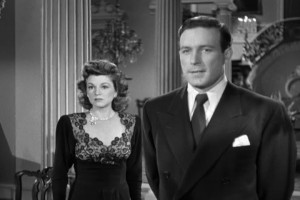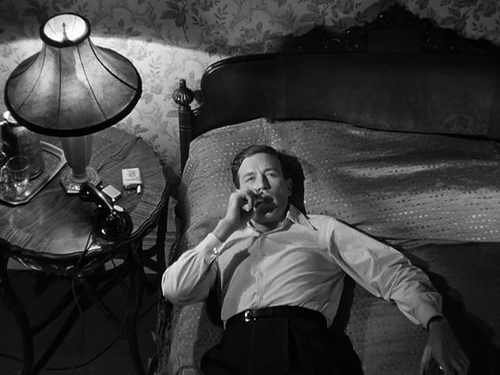Written by Eve Greene and Richard Macaulay
Directed by Robert Wise
U.S.A., 1947
Helen Brent (Claire Trevor) is in Reno, Nevada for a few days to settle a divorce. She stays at a nearby ‘bed and breakfast’ type establishment where the fun natured caretaker Mrs. Kraft (Esther Howard) and neighbor Laurey Palmer (Isabel Jewell) seem to spend more time drinking and laughing than anything else. Upon visiting a casino one evening, Helen makes eye contact with a tall, square-jawed handsome man named Sam Wilde (Lawrence Tierney), whose family name suites him perfectly. Sam, prone to violent outbursts driven by jealousy and lust, knows Laurey too, even having dated her. When discovering she has a new boyfriend, Sam murders them both in cold blood in a manner that would make Jason Voorhees proud. Sam them follows Helen to San Francisco, hoping to cozy up with the her as well. The fact that she has a fiancé (Philip Terry) does little to dissuade Sam, especially when her single sister Georgia (Audrey Long) can be used as a conduit…
Robert Wise is up to his usual tricks with his 1947 character study Born to Kill. Wise was an incredibly skilled director whose creative talent could be applied to almost any genre. Some of his best efforts in fact were noirs, The Set-Up from 1949 arguably topping that list. Born to Kill does not reach the same heights of dramatic texture as the classic he would direct two years later, yet is driven by its own set of particularities with respect to the characterization of the female lead, Helen Brent, as played by the always classy Claire Trevor.
In Film Noir (James Ursini, Paul Duncan, Alain Silver, Taschen, 2012), an entire chapter is dedicated to the place of women within the famous genre. Naturally, the predilection of many casual and ardent fans alike is to cite various femme fatale beauties that graced the screen with their unmistakably potent and treacherous sex appeal. True enough, those characters do leave the most lasting impact in viewers’ minds. That being said, a noir that takes a better rounded, more three-dimensional female character and places her as the lead is all the more special for it. Helen in Born to Kill does not possess the ferocity exuded by her male counterpart Sam Wilde, nor does she typify any ‘fatale’ qualities she most certainly could pull off considering her talents as an actress.
Nay, Helen is a women struggling with inner demons that, in any other film, could make her a femme fatale, but for reasons of economic security she fends them off as best she can when tempted by Sam’s advances. She can sense the attractive testosterone emanating from Sam’s awesome presence, yet her devotion to her new fiancé, albeit one steeped in practicality rather than emotional attachment, compels her to place a barrier between herself and her pursuer. She both loathes and desires Sam. Fully aware that he is up to no good (in her defense, she is not privy to Sam’s murderous ways for the better part of the picture), his mere steadfastness, his insatiable desire to get his hands on what he firmly believes his hands should touch sparks curiosity, arousal, even a perverted sense of freedom. Sam and Helen may share approximately the same amount of screen time, but Helen is definitely the more nuanced, layered and by extent more compelling character of the two. Claire Trevor is absolutely fantastic when juggling Helen’s various facades and genuine reactions. At times she must pretend to adore Sam when in the company of her sister Georgia, other times verbosely battling Sam with snide remarks, still other times practically giving in to his manly magnetism.

Sadly, Sam proves to be one of the picture’s weaker links, which is does not equate to him being weak per say, but just not on par with the other colourful personalities. Tierny is essentially doing what the script demands of him, which is to play the part as a constantly paranoid, frequently vicious and occasionally charming womanizer. He is animalistic at heart, the more violent side to his animalism emerging a wee bit too often and too easily. An attempt to balance out his barely controllable machismo is the shorter, leaner deceptively kinder Marty, played by Elisha Cook Jr. The latter requires no introduction, not with the number of quality performances he gave throughout his career, usually in supporting roles such as here in Born to Kill. Less of a nervous wreck than his usual self, Cook appears to be the voice of reason (barely) to Sam’s hunger. There is a passing reference to them having ‘gotten through other times’ which adds a minimal amount of dimension to their partnership, but on the whole the pairing is an odd one. Why does Marty hang around Sam? What is in it for him? The matter is mostly unclear throughout the film. More importantly, iy seems odd that Sam has gotten this far in life as a murderous playboy without ever having been caught by the authorities. His suspicious attitude borders on psychosis at times. Why? Nobody seem to know, he simply is that way. For a character with as much screen time as he Sam, he comes off more as a foil than anything else.
One character who has not been mentioned up until now is the private detective tasked by the embittered Mrs. Kraft to hound her friend’s killer, Albert Arnett (Walter Slezak). He represents a unique instance wherein an aspect that should feel out of place and arguably is out of whack with almost everything else in the movie ironically ends up feeling right at home. A talented Austrian-born actor, Slezak makes no attempt to conceal his distinctly European accent, which is already one element fans might not expect with a private detective in an American noir, but the script makes him out to be something about a highly cultured, intellectual snob as well. Citing Bible passages to comment on the dour situation Helen finds her self in, passing references like ‘Et tu Brute?’ ‘Noblesse oblige’ and the like set Arnett completely apart. Why exactly the filmmakers made such a decision is anyone’s guess. Perhaps such amusing lines were added in after casting Slezak in order to reinforce his foreign quality. Regardless of how strange his inclusion may be, Slezak is very, very entertaining.
Born to Kill is another quality film courtesy of director Robert Wise. Much like Steven Soderbergh, Wise does not have a distinct style or a very exclusive voice. He was quite at ease handling virtually any kind of material. The film is assuredly directed and paced, with Wise concentrating on story and character rather than aesthetic flourishes that will immediately catch anyone’s eyes. If anything, it is worth seeking out for Claire Trevor and Walter Slezak alone.
-Edgar Chaput




